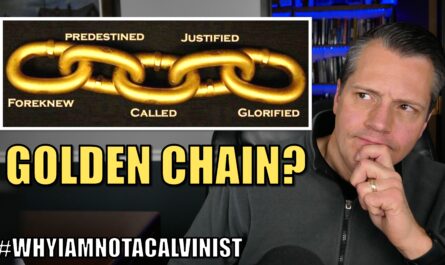Does God make it impossible for some people to believe the truth?
It sure seems that way when we read John 12. Apparently, God has blinded some people and hardened their hearts, rendering them unable to believe. Seems pretty Calvinist to me.
But is that really what happened? Let’s find out.
The background is that Jesus had publicly performed some impressive miracles. The crowds, with their own eyes, could see Jesus, the light sent to reveal God to them. However, they did not believe. We pick up in the middle of Jesus’ speech:
While you have the light, believe in the light, that you may become sons of light.” These things Jesus spoke, and departed, and was hidden from them. But although He had done so many signs before them, they did not believe in Him, that the word of Isaiah the prophet might be fulfilled, which he spoke: “Lord, who has believed our report? And to whom has the arm of the Lord been revealed?” Therefore they could not believe, because Isaiah said again: “He has blinded their eyes and hardened their hearts, lest they should see with their eyes, lest they should understand with their hearts and turn, so that I should heal them.” (John 12:36-40)
John plainly stated that they could not believe. But that raises an important question: why couldn’t they believe?
To explain why they could not believe, John quoted Isaiah. Because he used Isaiah’s words as an illustration, we need to see what Isaiah was talking about. Only then can we understand what John meant.
John’s quotation comes from Isaiah 6, where Isaiah had a vision of the throne room of God.
Also I heard the voice of the Lord, saying: “Whom shall I send, And who will go for Us?” Then I said, “Here am I! Send me.” And He said, “Go, and tell this people: ‘Keep on hearing, but do not understand; keep on seeing, but do not perceive.’ Make the heart of this people dull, and their ears heavy, and shut their eyes; lest they see with their eyes, and hear with their ears, and understand with their heart, and return and be healed.”
(Isaiah 6:8-10)
Isaiah’s task was strange: he was to preach to the people of Israel but command them not to understand or receive his message.
Why would he have to do that? Did God not want His people to understand the truth and turn from their rebellion? Did He not use most of the Old Testament to command them to do exactly that?
By the way, it might be worth pointing out that God was intervening here to take away their ability to understand the truth and repent. Which means, of course, that they had the ability.
But we have two important questions that we need to answer:
1. Why should Isaiah make them unable to understand?
2. How was he to do this?
The answer to the second question is answered in verse nine. Isaiah was to continue preaching to them a message that would further harden their hearts. The more he preached, the more they would refuse to hear it. So, God’s command is this: “Keep preaching, Isaiah! Push them further away!”
Most importantly, though, we want to know why God would do this. Why would God tell Isaiah to keep preaching, knowing it would drive them further into rebellion?
The answer is actually in the question. These people were already so far into rebellion that they wanted no part of the truth. The more preaching they heard, the more sin they committed. Because they had chosen to reject the truth and accept the punishment, God gave them more truth so He could give them more punishment.
I often have people share with me difficulty over a family member who has gone astray. I usually counsel them to refrain from “hounding” the person, because that will drive a further wedge between them. In this situation, however, God commanded Isaiah to keep driving that wedge deeper.
This is the same thing we find in Romans 1, where Paul discusses people who chose to reject general revelation.
And even as they did not like to retain God in their knowledge, God gave them over to a debased mind, to do those things which are not fitting; (Romans 1:28)
They made their decision to reject what they knew was right, so God just gave them up to go their own way and accept the consequences.
Isaiah realized the dire predicament the Israelites have gotten themselves into. After all, when a merciful God wants to push you further away from repentance, you are in some serious trouble. So, he wanted to know how long this will go on.
Then I said, “Lord, how long?” And He answered: “Until the cities are laid waste and without inhabitant, the houses are without a man, the land is utterly desolate, the Lord has removed men far away, and the forsaken places are many in the midst of the land.
(Isaiah 6:11-12)
Until the punishment was complete, Isaiah was to preach, and his preaching would continue to harden their hearts.
Now, before we return to John 12, let’s take a detour to the book of Acts where Paul also quotes from this passage in Isaiah. Paul, having recently arrived in Rome, called together the Jews to explain that he was imprisoned because of his passion for Israel. They decided to hear him out, so they listened to him preach all day. Some believed and some did not (Acts 28:24).
And some were persuaded by the things which were spoken, and some disbelieved. So when they did not agree among themselves, they departed after Paul had said one word: “The Holy Spirit spoke rightly through Isaiah the prophet to our fathers, saying, ‘Go to this people and say: “Hearing you will hear, and shall not understand; and seeing you will see, and not perceive; for the hearts of this people have grown dull. Their ears are hard of hearing, and their eyes they have closed, lest they should see with their eyes and hear with their ears, lest they should understand with their hearts and turn, So that I should heal them.” ‘ “Therefore let it be known to you that the salvation of God has been sent to the Gentiles, and they will hear it!”
(Acts 28:24-28)
Notice that in Paul’s reading of Isaiah, the people had closed off their own ears and eyes. Isaiah 6 is not about God choosing that some will be able to listen and some will not, but about some people refusing to listen, inviting God’s judgment.
In other words, they could not believe because they would not. God was through with them.
Now, back to John 12. John used Isaiah as an illustration because just like the ancient Israelites, Jesus’ audience chose not to believe what they saw, so God just let them go on their own path, which led to judgment.
Reading on in John, Jesus indicated that it was their own rejection of Jesus that sealed their fate. He puts the blame on them, not on God.
Then Jesus cried out and said, “He who believes in Me, believes not in Me but in Him who sent Me. And he who sees Me sees Him who sent Me. I have come as a light into the world, that whoever believes in Me should not abide in darkness. And if anyone hears My words and does not believe, I do not judge him; for I did not come to judge the world but to save the world. He who rejects Me, and does not receive My words, has that which judges him–the word that I have spoken will judge him in the last day. (John 12:44-48)
So, in summary, the audiences of both Isaiah and Jesus had something in common: they had chosen to reject a clear presentation of the truth. Having rejected the truth, they could not believe. This inability was not imposed on them by God, but by their own rejection of the truth.



